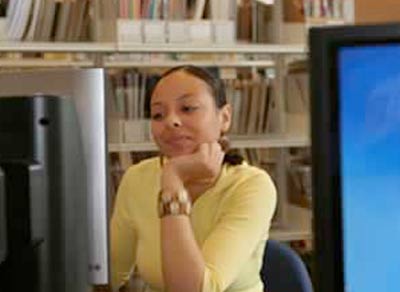(单词翻译:单击)
情景对话
Tom: Do you have computers in your classroom?
汤姆:你们教室里有电脑吗?
Martin: No and I wish we did I think it would help out a lot of the teachers and a lot of the students to have more of an interactive experience and be able to research things as teachers are talking. What do you think Tom?
马丁:没有,我希望有,因为我认为电脑可以使学生和老师有更多的互动体验,而且可以研究老师所讲的内容。汤姆,你怎么想的?
Tom: I'm surprised that you want them. I think they're a terrible idea. I think they distract students they mean that the point of the lesson is lost that the teacher loses their control over where the class should go. I think it's ridiculous this drive to get computers absolutely everywhere.
汤姆:你希望教室里配备电脑,这真让我感到惊讶。我认为这是个糟糕的主意。因为我认为电脑会分散学生的注意力,学生们可能会错过课程的重点,老师也会失去对课堂的控制。将电脑推广到所有地方的做法非常荒谬。
Martin: Oh but don't you think it adds to giving a hands-on-experience especially with accounting or other business related applications that if the teacher is expressing it, if you don't have a computer you can't really have a hands-on experience and a lot of the lesson might be lost without actually doing it in the classroom and being able to check your work.
马丁:哦,你不认为电脑能提供实践经验吗?尤其是那些与会计学和其他与商业有关的应用程序,老师讲解以后,如果你没有电脑你就无法获得实践经验,许多课程可能因为没有在课堂上进行实践和检验而无法理解。
Tom: A lot of what you say is correct but I don't think you need to do it in the classroom. You can do all of that stuff at home and I think a computer is a very personal and individual activity. I'm not sure it's suitable for a classroom.
汤姆:你说的许多观点都是正确的,但是我并不认为你有必要在课堂上做这些事情。你可以在家里完成,我认为电脑是非常个人化的活动。我不清楚电脑是否适合在教室里使用。
Martin: I still think though hat it adds a lot to it and that they're able to express themselves and utilize the information that is expressed in the classroom then and there and they know they understand it versus if they go home and use it in a more personalized context.
马丁:我仍然认为电脑有很多用途,与回家在更个性化的环境中使用电脑相比,电脑可以帮助学生在课堂上表达自己,而且学生能立即应用在课堂上获得的信息,这样他们就知道他们已经掌握了这些信息。

译文属可可原创,仅供学习交流使用,未经许可请勿转载
重点讲解
重点讲解:
1. help out 帮助…做事;借钱给…;
例句:A good dictionary will help out in one's reading.
一部好的词典对阅读是有帮助的。
2. hands-on (经历或工作)亲身实践的,实际操作的;
例句:Ninety-nine per cent of primary pupils now have hands-on experience of computers.
现在99%的小学生都亲手操作过电脑。
3. be suitable for 合适的;适宜的;适当的;
例句:Not all men are suitable for that kind of work.
不是所有的人都适合从事那类工作。
4. add to 添加;增加;掺加;
例句:They have add two new product to their range.
他们给产品系列增添了两个新产品。
5. then and there 立即;立刻;
例句:A friend of Pip's invited them then and there to his college ball that night.
皮普的一个朋友当时就邀请他们参加他当晚的大学舞会。


